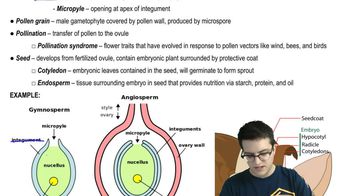Textbook Question
Auxin enhances cell elongation in all of these ways except:
a. Increased uptake of solutes
b. Gene activation
c. Acid-induced denaturation of cell wall proteins
d. Cell wall loosening
1094
views

 Verified step by step guidance
Verified step by step guidance



Auxin enhances cell elongation in all of these ways except:
a. Increased uptake of solutes
b. Gene activation
c. Acid-induced denaturation of cell wall proteins
d. Cell wall loosening
Charles and Francis Darwin discovered that
a. Auxin is responsible for phototropic curvature
b. Red light is most effective in shoot phototropism
c. Light destroys auxin
d. Light is perceived by the tips of coleoptiles
How may a plant respond to severe heat stress?
a. By reorienting leaves to increase evaporative cooling
b. By creating air tubes for ventilation
c. By producing heat-shock proteins, which may protect the plant's proteins from denaturing
d. By increasing the proportion of unsaturated fatty acids in cell membranes, reducing their fluidity